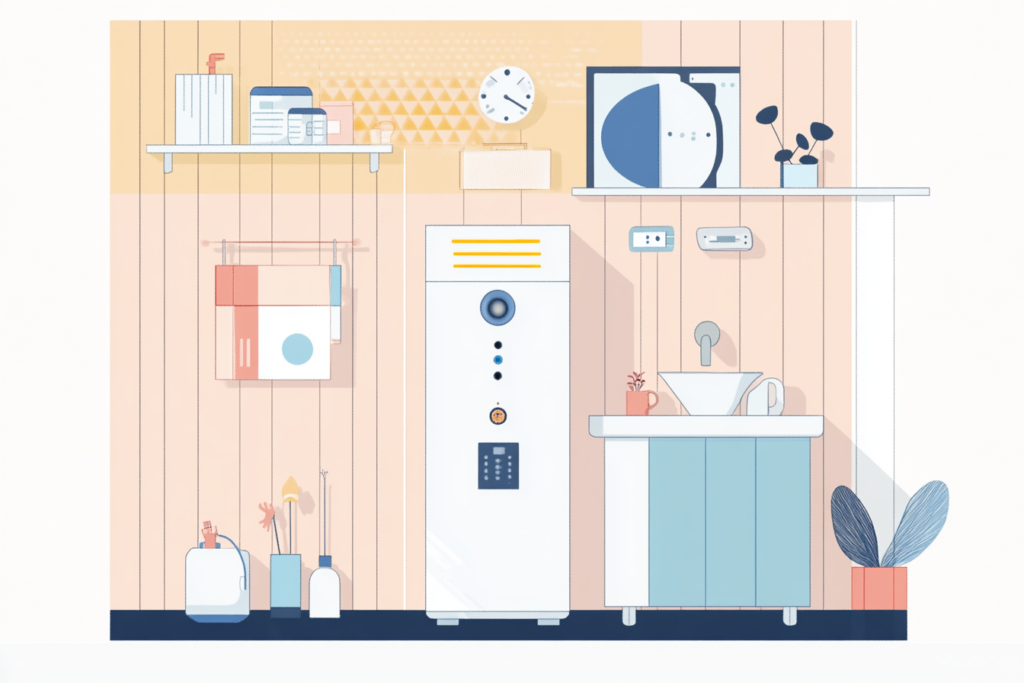If you’ve ever had to race the rest of your household to the shower just to avoid the dreaded blast of cold water, a tankless water heater might be your new best friend. More homeowners are ditching the traditional tank model in favor of tankless systems—and it’s not just about hot showers on demand. Tankless water heaters save energy, free space, and even cut utility bills.
Here’s why going tankless might be the smartest move you make this year.
1. Endless Hot Water—Whenever You Need It
This is the big one. Traditional water heaters store a pre-defined amount of hot water, usually 40 to 80 gallons. Once that’s gone, you’re stuck waiting for the tank to refill and heat again. Tankless systems heat water on demand, so it flows endlessly for as long as you need it.
Whether you’ve got a busy household with back-to-back showers or love soaking in the tub without watching the clock, a tankless unit means hot water that keeps up with your routine.
2. Save Space With a Compact Design
Tankless water heaters are small. Most units are about the size of a small carry-on suitcase and can be mounted on a wall. That’s a game-changer if you’re short on utility room space—or just tired of looking at a bulky tank.
They can be installed in small spaces such as closets, basements, or even outside (with weather protection), giving you back valuable square footage inside your home.
3. Lower Energy Bills With On-Demand Heating
Unlike tank heaters, which constantly reheat water to keep it hot, tankless units only heat water when needed. That difference adds up on your energy bill. According to ENERGY STAR, households can save hundreds per year depending on usage.
Here’s how the math breaks down:
- Tankless systems are typically 24%–34% more energy efficient for homes that use 41 gallons of hot water or less daily.
- For homes using more, installing multiple tankless units can still deliver savings.
4. Longer Lifespan = Better ROI
A traditional tank water heater typically lasts 8 to 12 years. With proper maintenance, tankless water heaters last closer to 15 to 20 years.
Not only do they last longer, but many models come with extended warranties (some up to 15 years on heat exchangers). That durability means fewer replacements over time, and more value from your investment.
5. Cleaner Water, No Sediment Buildup

With a tank heater, water sits and reheats inside the tank, leading to rust, scale, or sediment buildup over time, especially in areas with hard water. That sediment doesn’t just reduce efficiency—it can also end up in your tap water.
Tankless units don’t store water, so you get cleaner water whenever you turn on the faucet. You won’t have to worry about what’s floating in your shower stream.
6. Fewer Maintenance Headaches
While all water heaters need some upkeep, tankless systems generally require less frequent maintenance than tanks. Annual servicing is usually enough, especially if a water softener or descaling system is installed.
Key tasks include:
- Checking and cleaning the filter
- Flushing mineral buildup (depending on water hardness)
- Verifying venting and system diagnostics
That’s about it—no draining giant tanks or replacing anode rods every few years.
7. Reliable Hot Water Without the “Cold Sandwich”
If you’ve ever felt a blast of cold water right after someone else finished using the hot water, you’ve experienced the “cold water sandwich.” To solve this, some tankless models now include built-in buffer tanks or recirculation pumps.
8. Smart Home Integration
Modern tankless units come with intuitive digital controls and compatibility with home automation systems. You can:
- Adjust temperature settings via smartphone
- Schedule recirculation to minimize wait time
- Get alerts for maintenance or diagnostics
- Track energy usage in real-time
These tech-forward features help fine-tune your home’s water heating based on your needs, not guesswork.
9. Safer for You and the Environment
Tankless heaters reduce the risk of overheating and water pressure buildup. Many models include:
- Built-in sensors to detect overheating
- Leak detection and auto-shutoff
- Lower carbon monoxide risks with sealed combustion
Plus, they shrink your home’s carbon footprint because they use less energy and emit fewer greenhouse gases—a win for you and the planet.
10. Possible Tax Credits and Rebates
Here’s a perk that hits your wallet in a good way: you may qualify for federal tax credits or utility rebates for installing a high-efficiency tankless water heater.
As of 2025, ENERGY STAR–certified units can qualify for a federal credit of 30% of the project cost, up to $600. Many local utilities also offer additional rebates. Always check your local programs before you buy.
11. Fast, Flexible Installation
While tankless units often cost more upfront, installation has gotten easier—and cheaper—over the years. Some brands now offer:
- Flexible venting options (like Schedule 40 PVC instead of metal venting)
- Half-inch gas line compatibility (reduces retrofitting)
- Quick-mount wall brackets and digital setup tools
Pro installers can usually complete the job in a day, especially if you’re replacing an existing system.
12. Ideal for Large Families and Multi-Use Homes
Tankless systems can be sized to fit your specific needs. In homes with high water demand—think large families, guest suites, or multi-shower households—tankless water heaters can be scaled or installed in parallel to ensure every outlet gets consistent hot water.
If you have a whirlpool tub, double-head shower, or multiple bathrooms that are regularly used, going tankless means you won’t have to choose between bathing and doing laundry.
Potential Downsides
No system is perfect, and it’s fair to weigh both sides:
- Higher upfront cost: Tankless heaters typically cost more to purchase and install.
- Lag time with some models: Older or budget models might have a short delay before hot water reaches your tap.
- May require upgrades: You may need to upgrade your gas line or electrical system to meet demand.
Final Take
Tankless water heaters offer many benefits, including endless hot water, lower energy bills, more space in your home, and smart-home-ready features. While they may cost more upfront, the long-term payoff—financial, environmental, and comfort-wise—makes them well worth considering.
You might also be interested in: Is Your Home Wasting Energy? Find Out With an Energy Audit




